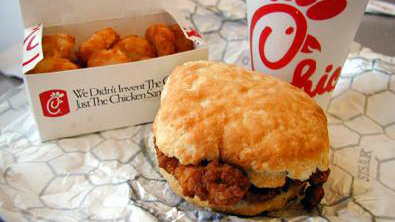Would you like a side of Christianity with that, Sir?

Don’t you just hate it when people that you fundamentally disagree with say something that you know to be true? Back in March, Brian Brown, president of the National Organization For Marriage (NOM), said “Corporations should not take sides in a culture war that pits a company against the majority of the American people.”
Corporations are units that exist for the purpose of generating profits so it is a difficult perspective to argue with – why publically take a position that alienates you from the majority of consumers?
This week Chick-fil-A took a stand; they came out and said that they oppose equal marriage rights. That is a surprising move in a time in which the majority of Americans are in favor of legal reform that allows same sex couples to marry. But before we rush to the conclusion that Chick-fil-A is a corporation that puts principles before profits, I would like to point out that just because the average American supports equal marriage rights does not mean that the average Chick-fil-A customer does as well.
I suspect that corporate bosses who decide to take sides on this particular “cultural war” know exactly who their customers are and where they stand on this issue.
Public opinion in the US is converging in favor of same-sex marriage in that the average US citizen now believes that marriage laws should be based on equality rather than a morality. A closer look at the data, however, tells us that public opinion is strongly diverging across racial, regional, religious and political divides.
For example, sociologist Dawn Michelle Baunach has looked at the change in attitudes towards same-sex marriage between 1988 and 2006 and found the following groups have been more willing to accept same sex marriage:
Educated people didn’t change their opinion by much, but that is largely because many of those people agreed with equal marriage rights right from the beginning.
I don’t know who eats at Chick-fil-A (or, for that matter, anyone who does), but I can guess what type of consumer frequents Starbucks, the corporation whose support of equal marriage prompted the NOM quote above – those who are likely to already be in favor of equal marriage rights.
The question here of course is does this really matter?
References:
Baunach, Dawn Michelle. “Decomposing Trends in Attitudes Toward Gay Marriage, 1988–2006.” Social Science Quarterly, 92, no. 2 (2011): 346–363.





